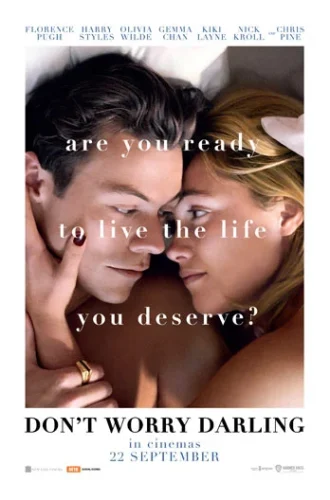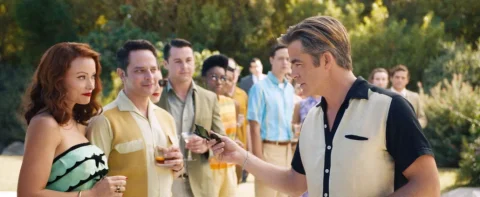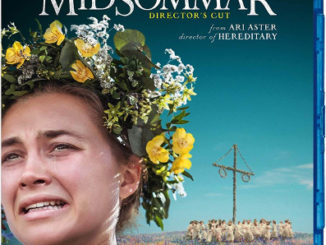Don't Worry Darling (2022)
Directed by: Olivia Wilde
Written by: Carey Van Dyke, Katie Silberman, Shane Van Dyke
Starring: Chris Pine, Florence Pugh, Harry Styles, Olivia Wilde
USA
IN CINEMAS NOW
RUNNING TIME: 122 mins
REVIEWED BY: Dr Lenera

At the idyllic 1950’s company town of Victory, California, the men go to work at Victory Headquarters out in the surrounding desert, while their wives stay home to clean, relax, and prepare dinner. They’re discouraged from asking questions about their husbands’ work and are told not to venture out to Headquarters due to the “dangerous materials” the company develops. One morning, Alice Chamber sees a biplane crash in the desert and, after touching a mirror on the outside of Victory Headquarters, starts to experience strange hallucinations. No one believes her, and then she sees Margaret, an outcast who supposedly took her son out into the desert though she denies it, kill herself. Before she can reach Margaret’s body, Alice is forcibly taken home by strange men in red jumpsuits….

It’s never a good sign when one guesses some of what’s going on within just ten minutes, but then again Don’t Worry Darling is very much three films rolled into one combined with tiresomely trendy “men are bad” stuff, and well known films too. If I mention all of them [I think I’ll get away with one] then you’ll probably work things out very easily, but then again you may do that even if I don’t. Whatever you do or don’t work out, the resolution to this film is very unsatisfactory in more ways than one, though whether I’ll be able to explain why while still keeping vague is something I’m not sure about. One thing I’m sure of though; while the screenplay by Katie Silberman, from a story by her, Shane and Carey Van Dyke, has some major problems, director Olivia Wilde immediately creates a really uneasy paranoid atmosphere even when little is really happening and when some of the tricks she uses [mirrors, yawn] have been done to death, and sustains it for much of its length so well that certain details like the odd hallucinations suffered by the main character which briefly take us out of the stifling yet pretty main setting don’t really seem necessary. What with trouble on set between Wilde and Shia LeBeouf who was originally cast in the role of Jack Chambers, Wilde and lead actress Florence Pugh, and Pugh and Chris Pine who plays Frank who’s in charge of Victory, it’s pretty amazing that things have turned out as good as they have, though of course there’s actually a good argument for friction during the shooting of a film actually helping a film’s effect – not that Pugh would probably agree, even though her performance is as superlative as we’ve come to expect from this consummate actress.
So we begin with happiness, and fun, as three couples in a house are knocking back the booze. One thing that’s immediately noticeable, though, is how subservient the women are to the men. They’re are the ones serving the drinks, trying to balance the trays on their heads and actually doing a pretty good job of it. Alice and Jack Chambers, the hosts, seem to be very much still in lust as in love, still going through their honeymoon period, and, while there are issues with Harry Styles’s performance as Jack, he and Pugh do possess at least some of the erotic chemistry to make us believe their passion. But Alice starts to become unhappy with the way things are. The trigger is Margaret. She was once in Alice’s circle of friends, but they didn’t want to know her after after taking her son out into the desert, resulting in her son’s apparent death, although she claims that Victory took her son from her as punishment for trying to leave. Alice sees her walking by, crying “you shouldn’t be here, you need to leave here”, then standing by her house, apparently immobile. The company’s enigmatic head Frank holds a party. and during it Alice sees Margaret’s husband giving her medicine and then not letting Alice see her. Alice is also becoming increasingly curious about what on earth the men are actually doing out there in the desert, but everyone else thinks that she shouldn’t be asking such questions. After all, everybody’s happy in this town, aren’t they? All this is quite slow paced, but the unsettling feel is pretty well achieved. In particular, while Jack seems to be the loving husband and provider, there’s something seriously off about Frank, especially when he watches Jack and Alice having a quickie at the party while nobody else is supposed to be around. And what’s with those two strange kids?
Yes, it’s a bit Truman Show, and proceeds for some time as a reasonably worthwhile variation of it. Alice sees this plane crash [an event never followed up on] and rushes out into the desert to help, in the process accidentally stumbling onto Victory Headquarters, a small building covered in mirror-like windows. After touching one, she experiences surreal hallucinations before waking up back home later that night to find Jack preparing their dinner. In the following days, she’s almost crushed between a wall and a moving window, and she also finds a box of eggs is filled with hollow shells [another event never followed up on, there’s a lot of those in this movie]. She receives a phone call from Margaret, who claims to have seen some of the same things that Alice did. Later, during a dance lesson given by Frank’s wife Shelley, Alice sees a vision of Margaret’s reflection violently banging her head against a mirror. She rushes back to their neighborhood just in time to see Margaret slit her throat and fall from the roof of her house. Before she can reach Margaret’s body, Alice is dragged away by strange men in red jumpsuits [who constitute yet another thing which is never followed up on]. Alice attempts to explain the events to Jack, but Jack dismisses them, explaining that Margaret simply fell while cleaning the windows and is recovering in the hospital with her husband. This version is further corroborated by the creepy town physician Dr. Collins, who attempts to give Alice the same prescription drugs used in Margaret’s treatment. She feels that Frank is watching her every move, while her friend Bunny accuses Alice of being selfish and attempting to “ruin everything for everyone” and says that Alice “sounds just like Margaret.” Indeed it’s her husband’s job which is most important, and this supposedly silly woman could ruin things for him, couldn’t she?

The ’50s setting is both gorgeous to look at and very fake, and it’s greatly lingered upon and emphasised, perhaps too much for some though you know that this going to be quite a leisurely piece anyway, though we could have done with more of a sense of Alice and Margaret being friends; in fact Kiki Layne’s role as the latter was severely cut down and is now merely figurative. Conversations are full of understated tension even if most of the people seem to not really have minds of their own. Especially edgy are the scenes between Alice and Frank, enhanced of course by our knowledge of Pine’s supposed harassment of Pugh, but they’d be effective I think if we try to dismiss that from our minds – in fact the not always particularly impressive Pine, playing a character based on Jordan Peterson, has rarely been better. He’s superbly smarmy and sinister even though for much of the time he’s not required to do much. Margaret’s mirror banging scene rehashes an image which we’ve seen in a fair few horror films, but the wall bit is frightening and Alice wrapping her head with food wrap is quite nightmarish, especially when her face is horribly distorted. Her visions take the form of a blood spot, an eye, and a group of dancing women in black and white whose legs moving in unison not just evoke a Busby Berkeley musical number but who create a circular shape that evokes the aforementioned eye. However – guess what? – it’s never explained why these should be the particular visions which Alice has. Of course it’s fine for some films to not explain stuff, but in a film like this that’s so reliant on its big reveal to just throw so much at us and then just leave us wondering it just seems lazy, even though one can guess a few things. Because some of the nature of what it’s all about is so obvious from the offset, the script has to divert our attention with lots of distractions, but by later ignoring many of these the overall story ends up coming across as rather half-baked.
Things certainly accelerate nicely towards the end and a car chase is certainly earned and is extremely tense even though Alice is rather too skilled for someone who probably rarely drives the car which her husband takes to work every day.However, by now we’re both confused and disappointed, and not just because this is yet another film about Hollywood’s favourite current subject, best known by that unpleasant term “toxic masculinity” – after all, we realise that very early on. And actually, things are often more subtle than you may expect considering that this a film from today, a time where everything often needs to shoved down our faces so we Get It. However, on the other hand, for example, us not really getting a sense of how almost anything in this place happens, and indeed works, is very problematic, and then there’s that totally out of character action by one of the secondary lead characters. The villains’ motivations are oversimplified to the point that their actions are rather illogical. It’s as if they deliberately planned to go about achieving their goals in the most convoluted, difficult way possible and in a way that would make them the most vulnerable that they could possibly be. And the script, considering its feminist aspects, curiously avoids what’s perhaps the most disturbing element in the story, one which revolves around sex, even though we do see two sex scenes. On the other hand let’s hear it out for the magnificent Pugh; I don’t think that it’s much of an understatement to say that she basically holds everything together. Without her totally convincing performance, not dissimilar to her one in Midsommar admittedly, Don’t Worry Darling might barely work at all. Then there’s Styles about whom I gather critics are divided. To be fair he does have a quite suave presence, and performs quite well in his early scenes but, seeing as he’s stuck with playing someone who turns out to be probably the most complex character in the film, he’s clearly out of his depth in his big dramatic scenes which he fails to pull off.
John Powell contributes an effective musical score which alternates between eerie strings, frantic full orchestra, ambient groans which act more as sound effects, and, unfortunately, taiko drums – I thought that their excessive use in Hollywood productions was over. One can sense the composer trying his very best to bring some sense to the film, but that’s probably a bit harsh. It’s really quite good for around three quarters of its length. Unfortunately, it’s also one of those movies which hinges on its denouement, and that’s where it falls apart, largely ruining what came before.








Be the first to comment